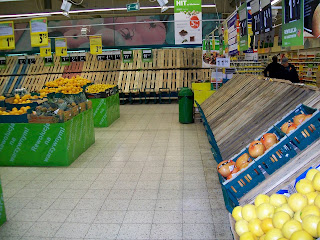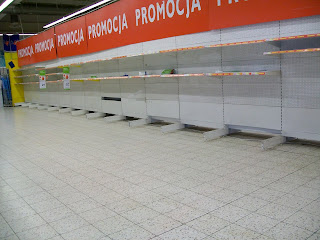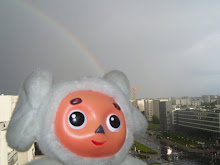My plans for Easter were turned on their head when I was informed that I would be helping to host Easter Sunday's breakfast. This was a bit of a shock, but we went about organizing to put on a gig to leave none unimpressed. Various chores needed to be done for a successful execution: from a thorough cleaning to an acquisition and preparing of all the ingredients.
The meal was planned to be in two stages: the main breakfast and the serving of white borscht (bialy barszcz.) The main stage of the breakfast—brunch, really—was going to be injected with a little American flavor with additions such as deviled eggs, asparagus, and semi-eggs benedict. I say semi-eggs benedict because there is a lack of two key ingredients: Canadian bacon and English muffins (the bacon was substituted with Bekon Mistrza Jana, which looks like pretty much the same thing.) I decided upon the deviled eggs because I got a hankering for them, and the eggs benedict because that is what my family used to have for Easter breakfast (the asparagus was served for Easter dinner.) My brother—an apt chef—was masterful at making the hollandaise, but stressed how hard it was to make it correctly. The Polish portion of the breakfast included a chicken salad, a sledz (herring) salad, pisanki (Easter eggs)—including quail eggs, and various cold cuts. The święconka was situated on the table as decoration. While searching for a correct way to make hollandaise sauce, I went to the Wikipedia page for it and was inspired by the picture of asparagus and potatoes with hollandaise; thus, I added potatoes to the menu. It needed a starch anyway.
The second stage was dominated by bialy barszcz, with a cheese cake (sernik) for desert. The cheese cake alone called for fourteen eggs. This, added with the hard-boiled eggs for the barszcz, pisanki, and deviled eggs, plus the eggs for the hollandaise sauce and poached eggs, meant that we would be getting 5000% of our daily recommended intake of protein and cholesterol.
The plate of deviled eggs.
The potatoes, pisanki, poached eggs and bekon mistrza Jana, and the cold cuts spread with quail eggs (the quail eggs were made into pisanki before being peeled, hence the unnatural colors of the whites.)
While shopping for the meal, I spent hours fruitlessly looking for asparagus. Neither the massive stores of Leclerc (whose produce department usually sucks anyway), nor Tesco, nor even the venerable German Lidl had asparagus (why would these massive supermarkets have it? It's only a spring vegetable. Besides, they have plenty of space for apples and utterly tasteless tomatoes, neither of which are in season.) Lidl had jars of pickled white asparagus, and had the gall to be closed when I was frantically running around Easter Saturday afternoon (I been there earlier, on Holy Thursday.)
Tesco, which is supposed to be open twenty-four hours, was closing at 6PM, and there was a mad rush. Most of the produce was gone (see pictures below) and the lines were stacked. I got in one line, then moved to another. In the second line, a woman was checking out her goods and loading them into a pink backpack, but she looked awfully familiar. I could have sworn she was a student of mine from way-back when. As I walked to the subway, I passed her and blurted out, "Do I know you? Were you a student of mine?" She looked at me and a smile broke across her face. She was in fact, a former student of mine, and apparently I live on the same street as her parents. Small world, small city.
I carpeted the area, buying an unbelievable amount of eggs, but not finding a single stalk of asparagus! In a last resort, I went to the one open produce stall at a usual farmer's market, and pointedly asked if the proprietor had asparagus. And indeed he had! For the cost of 20zl per bunch. The asparagus (as I was to find out) was less than the freshest in spite the label that claimed to be the freshest. It was white asparagus, which I had never had, but I was overjoyed. The story ends well, with the hollandaise turning out OK, there being enough eggs to go around, and with me eating over half the asparagus myself (apparently the Poles are not the hugest fans of it.) The potatoes were a little over-boiled, but the poached egg and bekon combination was good enough for me. If the guests didn't like it, they didn't let it show.
The empty shelves of Tesco.
Nothing left of the promotions.
So, while these international megastores failed to provide the essential ingredient to the Easter breakfast, a single, brave soul, who was taking advantage that his competitors were home with their families, was able to sell me some overpriced, less-than-fresh asparagus. (The asparagus really tied the whole meal together.) Easter was saved, but not by whom you would think. It's just another one of those Easter miracles.
Oh, and we ate a crapload of eggs.





























